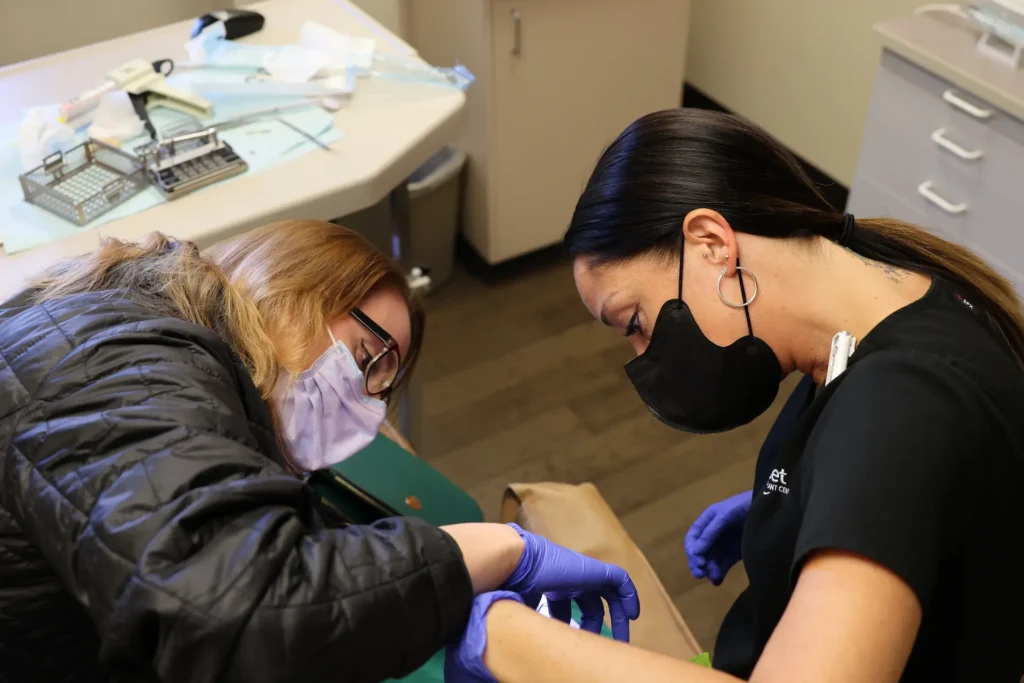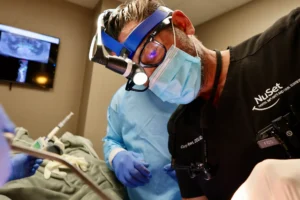Standard dental implants are a popular choice because they look and feel like natural teeth. They are often preferred over traditional dentures and bridges for comfort and appearance. Mini dental implants offer many of the same benefits and can be a great option if standard implants aren’t possible for you.
Both regular and mini implants are long-lasting solutions for missing teeth. They help restore your smile and work just like natural teeth. If you’re wondering which option is right, we’ll walk you through the similarities and differences to help you decide.
What Are Dental Implants?
Dental implants are a permanent way to replace missing teeth. A dental implant is a small titanium or zirconia post placed in your jawbone. This post acts like a root for your new tooth. Once the implant is in place, a crown is attached on top to look and work like a natural tooth.
Dental implants are strong, stable, and long-lasting. They not only improve your smile but also make eating and speaking easier. Since the implant fuses with your jawbone, it supports your other teeth and helps prevent bone loss.
What Are Mini Dental Implants?
Mini dental implants are smaller than regular implants. They are used to replace missing teeth or to secure dentures. The process of placing mini implants is less invasive and usually quicker than traditional implants. This means you can heal faster.
Like regular implants, mini implants are placed into your jawbone, but because they are smaller, they do not need as much bone to hold them in place. This makes them a good option if you have less bone in your jaw due to tooth decay and injury.
Mini implants can restore your smile and help you eat and speak more comfortably. They are strong and designed to last, but your dentist will help you decide if they are the best choice for you based on your needs.
Dental Implant vs. Mini Implant: Key Differences

Dental and mini implants both have benefits, but they differ in size, procedure, and healing time. Understanding these differences can help you decide which option best suits your needs.
| Factor | Dental implants | Mini implants |
| Size | Larger | Smaller |
| Procedure | More extensive | Less invasive |
| Bone requirement | Requires more bone | Requires less bone |
| Strength | Provides higher stability for stronger bite | May not be as strong, less suited for molars |
| Cost | $17, 500 – $25, 000 | $4, 000 – $5, 000 per implant |
| Best use case | Suitable for areas needing strong support | Better for areas with less bone or simpler needs |
Dental implants are larger and need more surgery, meaning longer recovery. Mini implants are smaller, placed faster, and you can recover more quickly. They also cost less and need less surgery, but they are not always the right choice for everyone. The amount and condition of your jawbone will help you decide which option is best for you.
At NuSet Dental Implants and Oral Surgery, we take the time to understand your treatment goals. We will carefully evaluate your jawbone and other factors to recommend the best option for your needs. Dental implants are usually better for long-term solutions, while mini implants can work in certain cases, especially if less bone is available.
Choosing the right implant also depends on the space and structure of your jawbone. Our dentist will thoroughly examine your situation to ensure you get the right fit. Experience matters and our team has the skills to place implants safely and with the best results.
Mini implants may be cheaper when comparing costs, but they don’t always offer the same strength and long-lasting stability as traditional implants. The decision to get dental implants should always be made with a dental specialist. We will work with you to create a personalized plan that fits your needs and expectations.
Ready to Restore Your Smile? Let Us Help You Decide
Regular and mini dental implants are effective solutions for replacing missing teeth. The right choice depends on your individual needs, bone structure, and overall health. Regular implants offer more strength and durability, while mini implants are a less invasive, faster option, especially for patients with less bone density.
At NuSet Dental Implants and Oral Surgery, our experienced team will guide you through the process and help you decide which option is best for your smile. We’ll take the time to understand your goals and recommend a treatment plan that fits your needs.
Contact us now to schedule a consultation and explore your best options.
FAQs
Are mini dental implants as good as regular implants?
Mini dental implants are a good option for some people but serve a different purpose than regular implants. They are smaller and less invasive and may be used when there isn’t enough bone for regular implants. However, regular implants are typically stronger and can handle more pressure from chewing. Mini implants work well for securing dentures or replacing smaller teeth but may not be suitable for every situation.
How long do mini implants last?
Mini implants can last several years, especially with good oral care and regular dental visits. They may not last as long as regular implants, though, particularly if they are placed in areas where there’s a lot of pressure from chewing, like the back teeth. The longevity of your mini implants also depends on your overall oral health and how well you maintain them.
Which type of dental implants are best?
The best type of dental implant depends on your specific needs and health conditions. Regular dental implants are generally stronger and more durable, making them ideal for replacing larger teeth or for patients who need long-term stability. On the other hand, Mini dental implants are less invasive, cost less, and are good for securing dentures or replacing smaller teeth. They are ideal if you have less bone density or prefer a faster, simpler procedure.
What is the difference between conventional implants and mini-diameter implants?
The biggest difference between conventional dental implants and mini-diameter implants is their size. Regular dental implants are larger, requiring more bone for support. They involve a more complex placement procedure and usually need a longer healing. Mini dental implants are smaller in size and require less bone for placement. This makes the procedure quicker and less invasive, with a shorter recovery time.
What are the disadvantages of mini implants?
Mini implants have some limitations compared to regular implants. They are smaller, which means they may not be as strong, especially for teeth that need to handle a lot of chewing pressure, like molars. They also may not last as long in these areas. Mini implants are best suited for patients with less bone density or for smaller teeth and denture stabilization, but they may not be the best choice for every patient.
How painful are mini implants?
The process of getting mini dental implants is not painful since you will be under sedation. Most patients report minimal discomfort, and the recovery time is shorter. Any pain you may experience can typically be managed with over-the-counter pain relievers, and your dentist will provide instructions for keeping pain and swelling under control.
Can you sleep with mini dental implants?
Yes, mini dental implants are a permanent solution and remain in your mouth just like natural teeth. This allows you to maintain your normal routine, including sleeping, without worrying about removing or adjusting your teeth. Once your implants are healed, they will feel like part of your natural smile, and you won’t need to treat them any differently than real teeth.
Can mini implants be done in one day?
Yes, mini implants can often be placed in one day. The procedure is less invasive than regular dental implants, allowing quicker placement and faster recovery. Sometimes, patients can leave the office with their mini implants and the restoration (such as dentures) already in place. However, whether this is possible for you will depend on your specific dental health and the complexity of the procedure. During your consultation, your dentist will let you know if you qualify for same-day mini implants.





